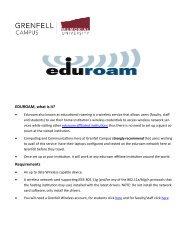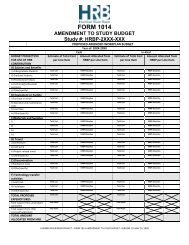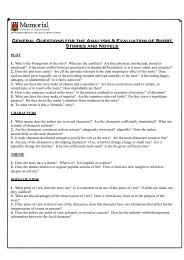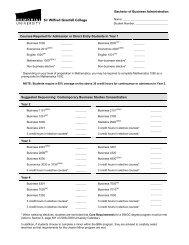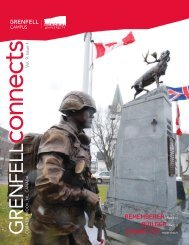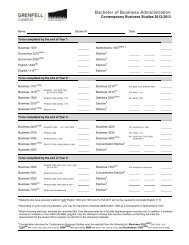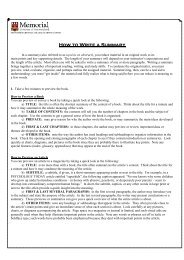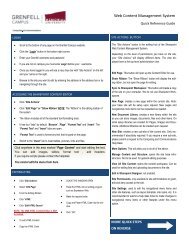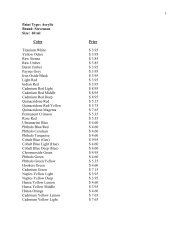Effective Admission Letters - Sir Wilfred Grenfell College
Effective Admission Letters - Sir Wilfred Grenfell College
Effective Admission Letters - Sir Wilfred Grenfell College
You also want an ePaper? Increase the reach of your titles
YUMPU automatically turns print PDFs into web optimized ePapers that Google loves.
SIR WILFRED GRENFELL COLLEGE LEARNING CENTRE<br />
<strong>Effective</strong> <strong>Admission</strong> <strong>Letters</strong><br />
How to Wriite an <strong>Effective</strong> Admiissiion Letter<br />
When you write a letter or personal statement as part of applying for graduate or professional school, you will make your<br />
case as much by the way you write as by what you say. Here are some of the qualities you need.<br />
Be Focused. Take your cue first from the prompt given in the application form. Is the main question why you want to be<br />
a lawyer, or is it why you will make a good one? If the prompt is very general or the questions scattered, decide what<br />
point you want to make overall: that you are a proven achiever, or that you can deal with challenges, or that you have<br />
something special to contribute to the profession….<br />
Be Coherent. Being “together” is a quality of writing as well as of character. A clearly organized letter can create a<br />
picture of a clear-minded and sensible person. You might want to write from an outline or a diagram of main points. At<br />
least check the topic sentences of each paragraph in your finished piece to see if they make a logical sequence. Ask a<br />
tough-minded friend to give her impression.<br />
Be interpretive. You need to make an impression concisely, so don’t use your letter just to repeat the facts set out in<br />
other parts of the application. Provide explicit answers for the question that arises in the mind of any reader looking at a<br />
hundred or more similar documents—“So, What?” Use nouns and adjectives that name qualities (outgoing, curiosity,<br />
confident) and verbs that show action (coordinated, investigated, tried). Make an effort to find the exact right ones to suit<br />
the evidence you are offering.<br />
Be specific. There’s no point making claims unless you can support them. Refer to the fact lists in other parts of your<br />
application (“as my academic record shows”), but be sure to offer enough examples in your letter so that it can stand on its<br />
own; say that they are just instances, not your whole proof (“An incident from last summer is an example….”). The<br />
concrete language you use for these specific references will also balance the generalizing words of your interpretive<br />
points.<br />
Be personal. Your letter substitutes for an interview. In effect, the readers have asked you to tell stories, mention details,<br />
expand on facts. So mention things you might not have put into the rest of the application—your ethnic background or<br />
political interests, even. Don’t be afraid to mention problems or difficulties; stress how you overcome them. Use “I”<br />
rather than phrases like “this writer” or “my experience” or “was experienced by my.” A stylistic tip: to avoid monotony,<br />
start some sentences with a subordinate clause such as “While I scrubbed floors” or “Because of my difficulties”—then go<br />
on to I did or I learned.<br />
Options for Organiziing an Admissiion Letter<br />
Judge by the clues on the application form and by the nature of the profession or discipline what kind of logical structure<br />
you could use to tie your points together into a coherent whole. You may see indications you are expected to tell stories,<br />
or be self-analytical, or to enter into discussions in the discipline. Here are some standard patterns for prose exposition:<br />
Narrative<br />
This has the virtue of being linear, and thus easy to organize. It progresses from a beginning to an end, and you can<br />
divide up the middle into manageable sections. But beware of overworked openings like “I have always wanted to be a<br />
dentist.” Make sure, too, that you balance interpretive points with specific facts.<br />
Analytic<br />
To answer “why?” questions you may have to use a structure that gives an overall answer and then discusses various<br />
aspects. This will sound more like an essay, so break into memorable stories at times and use lots of specific details.
<strong>Effective</strong> <strong>Admission</strong> <strong>Letters</strong> (cont.)<br />
Technical<br />
If you need to show your readers how much you can contribute to their field, you may find yourself writing a mini-report<br />
explaining your involvement in a specific issue (your summer research job or independent-study project, your program on<br />
student radio, your volunteer experience). Check it for clear factual references, and include a statement of why this topic<br />
represents you.<br />
References For More Advice<br />
Don’t give your reader any excuses to eliminate your letter. Proofread carefully for missing details as well as errors in<br />
grammar or punctuation. Don’t overload your sentences with jargon or pretentious words. A good college level writing<br />
handbook will help you out with matters of correctness. Visit the Learning Centre for help with composition and editing.<br />
Other Helpful Resources<br />
http://owl.english.purdue.edu/handouts/pw/p_applettr.html<br />
http://www.indiana.edu/~wts/wts/perstate.html<br />
http://www.auburn.edu/academic/liberal_arts/english/gs/current/careers/timeline/appletters.htm<br />
This information has been compiled and/or adapted by the Learning Centre. Please Drop by AS 234 and meet the assistants.<br />
Revised 2004




